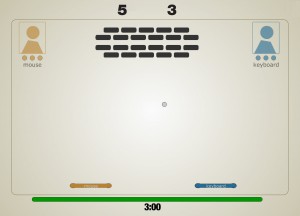 As part of the G-Motiv project we investigated social behavior change in a game context. Can we initiate cooperation or competition by slightly altering elements in a game?
As part of the G-Motiv project we investigated social behavior change in a game context. Can we initiate cooperation or competition by slightly altering elements in a game?
Game elements are the motivational building blocks for a game world experience. They may consist of rewards, challenges, phantasy world, etc. However, the game rules and goals might be the most basic and prominent elements to design a game. Rules and goals structure the player’s behavior in the game and are therefore at the hearth of the “procedural rhetoric” (Bogost 2007) of games. The behaviors of players define a game, not textual instruction or visual representation. Within a game the rules define this behavior, even if they are implicit.
To investigate the effect of rules on player behavior we conducted an experiment for which we designed two types of a multiplayer Breakout (or Arcanoid) game. The aim was to find out whether competitive or cooperative behavior could be evoked in participants by having different game rules in the two versions of the game. Participants were not informed about the rules or about them being different. To empirically test the effect of implicit rules all other game elements were kept the same. This resulted in a competition and collaboration game where the task, controls, and visuals were identical. Only the rule for goal attainment (i.e. scoring points) was different. In the cooperative game the players had to hit the ball alternately in order to score points. In the competitive game the player that hit the ball would score points. No instructions on these rules were given so this was only made explicit through the mechanics in the game.
We found that changing the implicit rules of the game had a significant effect on the players’ experiences (measured by asking them about experiences such as the extent to which they felt helped or obstructed) and behavioral patterns. Interestingly the players’ skills, knowledge, and attitudes did not seem to affect the results. The fact that they were engaged in a game made them search for the rules behind the game and eventually behave in compliance with these rules.
Niko Vegt
G-Motiv, February 2013


